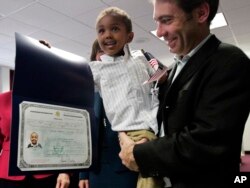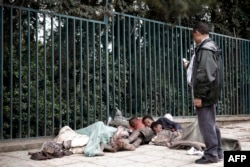A ban on the adoption of Ethiopian children by foreigners could curb child abuse and trafficking, but more support is needed for vulnerable families within the impoverished country, experts said on Monday.
Ethiopia is one of the biggest source countries for international adoptions by U.S. nationals, with about 20 percent of all adopted children coming from the east African nation, according to the U.S. State Department.
Hollywood celebrities Brad Pitt and Angelina Jolie are among those who have adopted children from Ethiopia.
Child rights groups cite cases of "child harvesting" where adoption agencies unethically recruit minors for adoption by fraudulently altering paperwork to cast children with families as orphans whose parents had died or abandoned them.
In many instances, parents who cannot afford to look after their children consent to foreign adoption under the mistaken impression that it is like boarding school and they would maintain contact with their children, only to find out later that this is not the case.
Amid concerns that overseas adoptions fuel a trade in children from poor families and put them at risk of abuse, or being trafficked into slave-like conditions, parliament passed legislation on Jan. 10 banning inter-country adoption.
"Ethiopia has negative experiences with foreign adoptions, particularly in regard to child laundering, child harvesting, and children taken from families primarily due to poverty," said David Smolin from the Center for Children, Law and Ethics at Samford University in the United States. "Ethiopia's ban on foreign adoptions is a reasonable response to past problems and to the need to focus efforts on assisting vulnerable children within Ethiopia."
While many Ethiopian children have thrived due to inter-country adoption, there have been cases where they have faced abuse, and even death, at the hands of adoptive families.
In 2013, a couple in the U.S. were convicted of killing an adopted 13-year-old Ethiopian girl. The crime sparked debate about foreign adoption in a nation where families are forced to give children up due to a lack of money to care for them.
But under international law, poverty should not be a grounds for international adoption, and efforts instead should be made in assisting families to stay together, say experts.
The revised law encourages local adoption, family reunification and reintegration to enable children to grow up within the country, said the state-run Ethiopian News Agency.
Adoption experts emphasized that Ethiopia will need to follow-up the ban with increased efforts to assist vulnerable families within the country, and provide them with the resources to adequately care for their children.
"The most important thing is for the children involved to have permanency, in families," said Adam Pertman, president of the U.S.-based National Center on Adoption and Permanency and author of "Adoption Nation."
"The first choice is within their own family of origin, their own community and their own country," he added.







